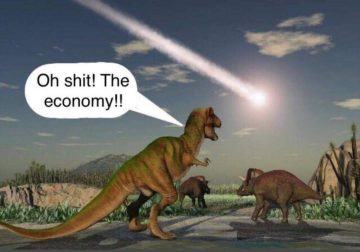by Thomas Wells
 Among other things Covid-19 is a moral crisis. It requires suspending the usual rules about who deserves what, firstly because it is impossible for many of us to pay what we owe in these conditions, and secondly because of the priority of the humanitarian duty to save as many lives as possible. Nevertheless we must not forget about justice. In particular we must make sure that the costs of this crisis are not born disproportionately by the poor, those least able to afford the burden but also least able to escape it.
Among other things Covid-19 is a moral crisis. It requires suspending the usual rules about who deserves what, firstly because it is impossible for many of us to pay what we owe in these conditions, and secondly because of the priority of the humanitarian duty to save as many lives as possible. Nevertheless we must not forget about justice. In particular we must make sure that the costs of this crisis are not born disproportionately by the poor, those least able to afford the burden but also least able to escape it.
An economy is a complex web made up of the promises we are continually making to each other. Those promises may not always be perfectly fair, but they are generally quite precise. They tell us what is expected from us and what we have the right to expect from others, from what time to take our kids to school to how many months of unemployment insurance we can count on if we lose our job. The trouble is that our ability to keep our promises depends on other people and organisations keeping their promises to us. If any particular link fails, it can be repaired, compensated, worked around, and so on. But if multiple links fail at the same time we are plunged into a moral crisis wherein our usual moral scripts cannot provide guidance. We need suddenly to look up from our tidy little life-worlds and think from the perspective of the whole (even global) society.
Many people, including leaders of government agencies and firms, have clearly struggled to get their heads around this breakdown of business-as-usual morality. They still see things in terms of what is fair or not under the old rules about what people deserve. Hence their slowness to recognise that gig workers need unemployment benefits even if they never paid the premiums, and that the uninsured need to know their medical care will be (almost) free. This is perhaps not so strange. As leaders well know, humans are very sensitive to promise-breaking and free-riding, and in normal times there is nothing more toxic to the functioning of any organisation or community. Fortunately most governments and even some businesses have recognised the need for a more humanitarian moral compass.
But capitalism has left us unused to thinking in simple human terms, about meeting people’s needs simply because their needs are great. It is not enough to bail out the companies for the sake of the economy if we lose the people the economy is supposed to support. There is a grave danger that without even thinking about it we will impose disproportionate and even unbearable costs upon the poor.
While the virus rages, the poor are the least able to protect themselves. They are less likely to be able to work from home; less able to access protective masks and gloves; less able to afford care if they fall ill with it. Moreover, the very measures we take to increase our safety make them disproportionately worse off. Shutting down the economy shuts them out of work, and hence out of food and shelter since they often lack the luxury of savings. Having to compete with hoarders leaves them with reduced or more expensive access to basic goods and hygiene products. This is not a state of affairs that can be sustained for the many months needed until the virus can be contained.
It is bad enough for the poor in rich world countries. In the densely populated urban slums of India or Sub-Saharan Africa the prospects for the poor are many times worse. Many poor countries spend a couple of dollars per year per person on public health and have effectively zero virus-testing and intensive-care capacity.
Moreover, the problems of the poor are not merely their problem. Containing the virus is a global collective good. If we force the poor to choose between going to work sick and staying home unpaid and hungry we should not be surprised that they cannot afford the sacrifice we are asking of them. Neglecting the poor undermines everything the terribly expensive economic shutdowns are supposed to achieve.
The poor deserve a new promise: that they will be no less protected than the rest of society against this virus and that they will not pay a greater price in the struggle to overcome it. Radical border-crossing measures are needed and quickly, probably including something like a global basic income as well as an enormous expansion of medical care and ambition.
Covid-19 is a crisis in another sense. It is a moment when we get to choose one path or another. We can choose to stick to our old habits of first deciding who deserves to be helped (people like us) and then thinking about what to do. That would leave the poor to carry an impossible burden. Or we can choose to start from an assessment of the needs that people all around the world have in this time and then think about how we can best meet them.
